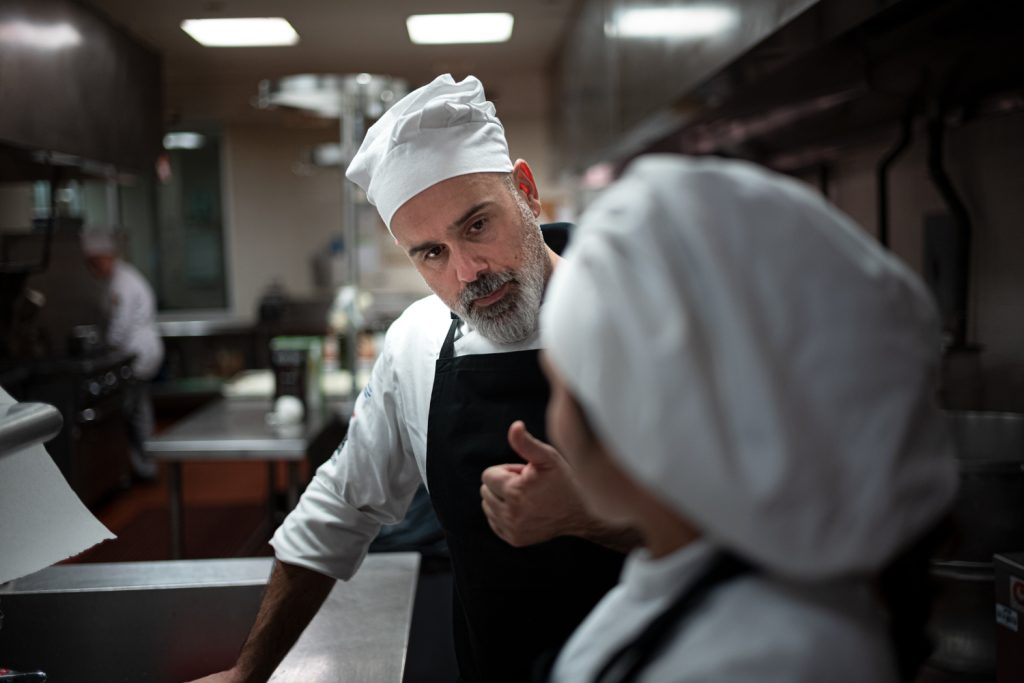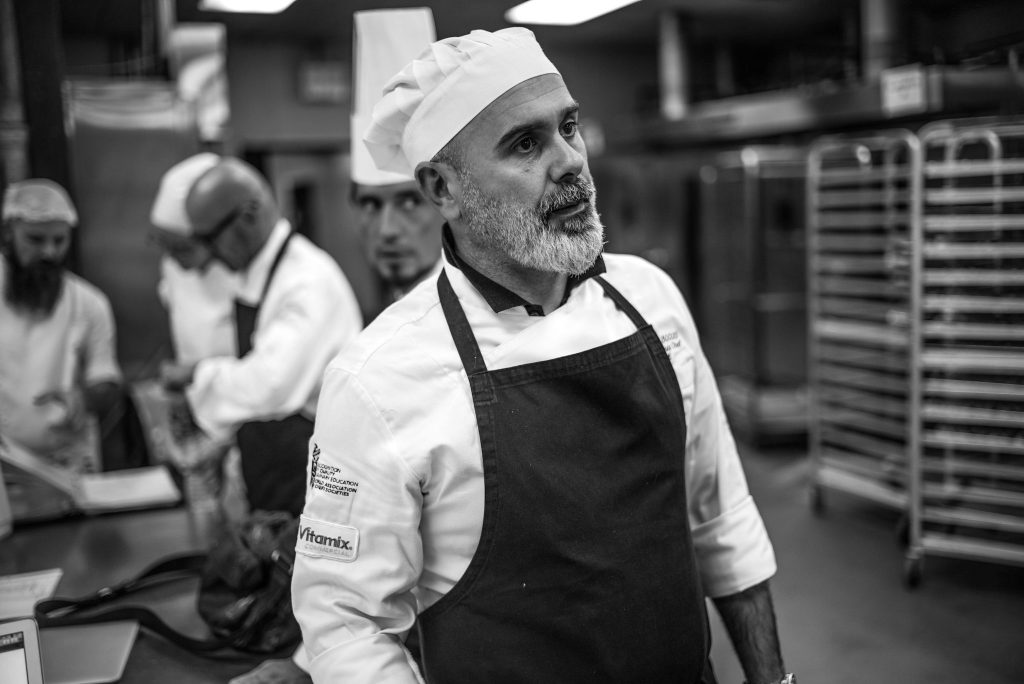Preface 2023
Preface – magazine 2023 A contemporary magazine feeds upon dynamism and vigour. It instantly perceives the inputs deriving from the readers and evolves, offering its best at...
Preface – magazine 2023 A contemporary magazine feeds upon dynamism and vigour. It instantly perceives the inputs deriving from the readers and evolves, offering its best at...
Nicoletta Arbusti A sunny day, mild weather. Sweet as the taste of the biscuits Massimo Bocus offers me. He is the Executive Sous Chef and Director of Food and Wine Studies at...
My wine story continues. I will start now with the visual analysis of the wine. That allows us to understand how the vinification and storage occurred, the age of the wine and the...
The salt routes Ilaria Persello Salt roads are ancient commercial routes which have remained unchanged for centuries. They have connected coastal cities with the inland and vice...
Our body is a sacred place. We need to cure, love and protect it. Natural bodybuilding was born in contraposition to classic bodybuilding. It consists literally of natural...
Technologies from the aerospace sector make food production eco-friendly and improve the quality of what we bring to our tables. They may seem worlds apart, yet food and aerospace...
They showed the film Spartacus, directed by Stanley Kubrick, for the first time in October 1960, in New York. The protagonist, Kirk Douglas, was the rebel gladiator. He was also...
THE THOUSAND MEDITERRANEAN SHORES OF THE ISLAND, ONE AND INFINITE The historian Fernand Braudel affirms that the Mediterranean is a thousand things together. In contrast,...
Galactic gardens, eating among the stars, and space menus!!! Going of the moon to inhabit it, and from there, explore the deepest space, Mars, and other celestial bodies of the...
I intend to offer some views on the analysis of wine. You can indeed enjoy wine or not. However, whenever you have a glass of wine in your hands, it becomes fundamental to...
Nicoletta Arbusti
A sunny day, mild weather. Sweet as the taste of the biscuits Massimo Bocus offers me. He is the Executive Sous Chef and Director of Food and Wine Studies at Apicius, the School of Hospitality at FUA – AUF, Florence University of Arts – American University of Florence.
Massimo studied law at university, but his greatest passion is the job he has chosen and performed enthusiastically after several experiences in the food sector.
Today, he is the director and teacher of this prestigious School of Food and Wine.
We meet at the Fedora Bar, in a historical garden of the thirteenth century, full of citruses and aromatic herbs. Silent and cosy, it is called Cafaggio del Vescovo and is inside the Palazzo Villani Stiozzi Ridolfi, a few steps from the dome of Brunelleschi, in the heart of Florence.
The headquarter of APICIUS, the International School of Hospitality, is here. Founded in 1997, it is today a leading international school in career-oriented academic and professional studies.
‘Apicius is one of the six most well-known Hospitality Schools in the world’, he tells me as we climb the old staircase leading to the upper floor of the building where the classrooms with the kitchens and the rooms for oenology are.
‘The departments inside the School of Food and Beverage include baking and pastry-making, culinary art, cuisine and culture. But also wine and culture, wine expertise, food and consumer science, dietetics and nutrition.
Whichever the chosen programme, students immerse themselves in career simulations from day one through courses organised in real-world conditions, with practical objects, interdisciplinary activities, and robust education. We have defined each programme so that students acquire the knowledge and competencies to succeed in this ever-evolving field.’
Inside classrooms and hallways, lively and coloured posters with English catchphrases invite you to cook and taste the delicacies from these laboratories.
Some of the aims of Apicius are: to offer a professional and academic environment where students gain competencies in hospitality and tourism, culinary art, bread and pastry making, and the study of wine. We go beyond the study in classrooms and prefer the interaction of students – supporting the encounter of various worlds and cultures, even culinary heritage – who, once in Florence, can express themselves through practical and unique experiences in connection with the several professional figures operating in different fields. This happens inside our pastry shop, the Bistrot Fedora and our restaurant Ganzo.
He continues:
‘One of our aims is to reinforce the idea of technical apprenticeship integrating training opportunities in the curricula and have students involved in cultural integration projects, which require active involvement in the Florentine and Italian society. We award stimulating professional experiences.
The growing link among technological, multimedia and communication aspects with ancient cuisine and tourism practices requires experts who possess deep understanding rooted in the tradition and perfected competencies combined with the ability to adapt to the changeable fluctuations of the present.’
I ask if the experience students gain at their Fedora patisserie and at Ganzo Restaurant illustrates all of this.
‘For sure!’ he replies. ‘These places, such as, for example, Fedora, are open to people for breakfast, a light lunch or an aperitif. Instead, they can have dinner at Ganzo. These are businesses managed by students under the supervision of our teachers. Places where cultures meet since our students come from all over the world.
Our academic structure is based on lessons, workshops, seminars and, most of all, laboratories, which activate distinct types of involvement with the learning subjects.’
For example, what does your menu offer?
‘First of all, students, under the supervision of the chef, define the menu. It varies according to the themes of the academic courses and changes from one semester to another.
On the menu, there is a careful selection of ingredients from the Italian tradition, presented in a simple but inviting way.
When we define the menu, our attention goes towards the right balance among meat, fish, vegan dishes or carbs. Everything is cooked thoroughly and respecting our Italian cooking tradition.’
What is Apicius Friends?
‘Apicious Friends is a project whose primary aim is to share with students the culture of hospitality, the food and wine of our country through direct contact with food and wine partner companies, hotels and restaurants, thanks to a rich selection of Italian enterprises presented to all students following our courses.’
Suddenly, while we speak, I notice the colourful poster on the wall, which declares: “Cooking with love provides Food for the Soul”. I cannot think how true this is.
Exactly as Massimo Bocus manages to accomplish in his work and with his students.Arbus


Photo© David Andre Weiss